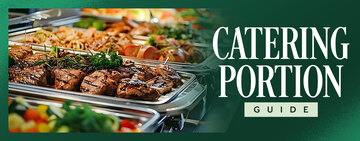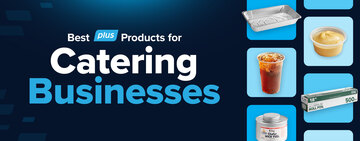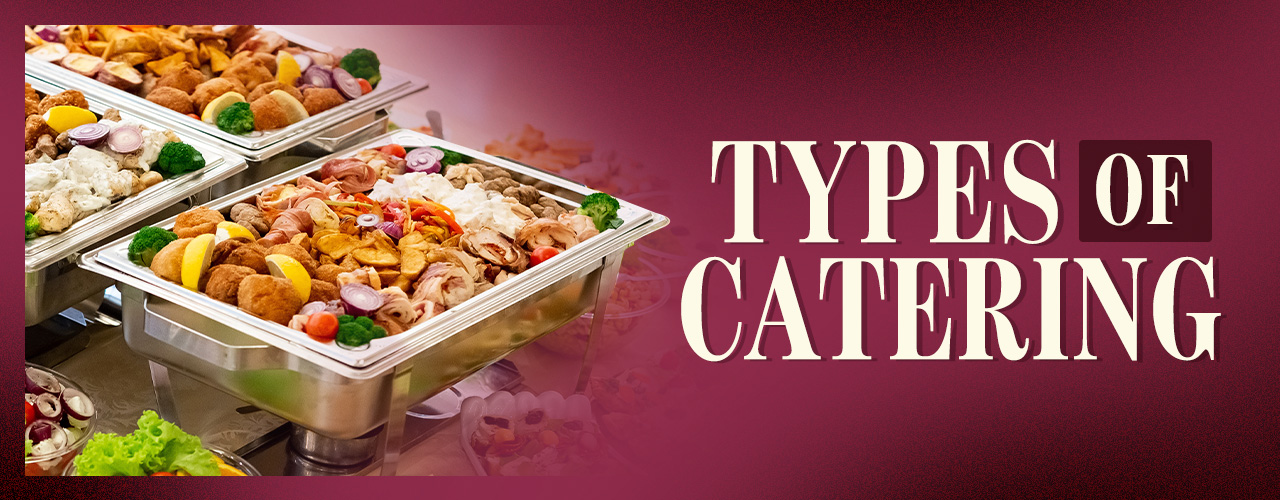
Catering businesses play a crucial role in providing food and drink service for large groups of people. From intimate family gatherings to grand corporate events or elegant weddings, the spectrum of catered events is vast and diverse. For those who have recently launched a catering business or are contemplating adding a catering menu to their restaurant, understanding the different types of services you can offer is essential. We'll outline the most popular and distinct types of catering below so that you can pinpoint a target market and tailor your services to meet their specific needs.
1. Wedding Catering
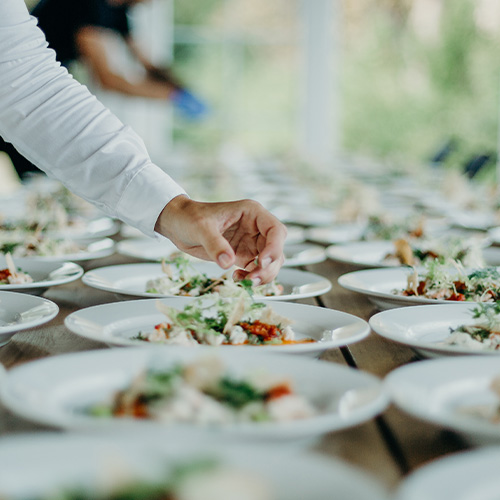
As its name suggests, wedding catering is a specialized catering service that prepares food and drinks for weddings. It involves a significant amount of planning in advance, as the couple getting married will typically be involved in choosing the menu and coordinating with other parties involved, such as the venue and entertainment.
Successfully catering a wedding requires clear communication with your staff and servers to ensure that everything goes as planned. In most cases, meals will be served at the table with assigned seats, but some weddings may offer a more relaxed grab-and-go style of dining. Plan out and time each course according to what the couple wishes, adhering to their theme, preferences, and dietary requirements.
Standard Wedding Catering Offerings
- Food: Passed Hors D'oeuvres, Stationed Appetizers, Plated Meals, Buffets, Action Stations, Plated Desserts, Stationed Desserts, Late-Night Snack Stations
- Beverage: Alcohol Service, Non-Alcoholic Service or Stationed, Water/Coffee/Tea Service or Stationed
- Specialty: Vendor Meals, Alternative Diet Accommodations, Pre-event Planning Tasting
2. BBQ Catering
BBQ catering offers a more relaxed style of catering where guests can enjoy their food as they please in a laid-back atmosphere. Most BBQ catering menus are grab-and-go or buffet style, providing flexibility and a wealth of menu options to choose from. You can expect to serve BBQ-style meats, including burgers, ribs, and pulled pork, as well as classic sides like potato salad, corn on the cob, or coleslaw.
Depending on your preference, foods can be prepared off-site and transported to the location, or you can opt to prepare the foods on-site for maximum freshness. When preparing foods on-site, you'll need to coordinate the movement of essential BBQ equipment, such as smokers or grills, and prepare your staff for working in an outdoor environment. Make sure you come prepared with all necessary serving supplies, prioritizing disposable plates, cups, and utensils for easy cleanup.
Standard BBQ Catering Offerings
- Food: Stationed Appetizers, Buffet Meals, Stationed Desserts
- Beverage: Alcoholic (typically limited to wine and beer) and Non-Alcoholic Service or Stationed
- Specialty: Alternative Diet Accommodations
3. Food Truck Catering
The simplicity of food truck catering lies in its streamlined process. Essentially, the truck just needs to arrive on-site with enough food in stock to accommodate the expected number of guests, making it an attractive option for event planners looking for a hassle-free catering solution. Thanks to their laid-back vibe, food trucks are a popular choice for catering informal events, like picnics or company parties. They also add a touch of excitement to wedding receptions, providing guests with easy access to tasty snacks.
Some food truck caterers may opt to offer a limited menu. Food preparation can be done in advance, making it easier and faster to serve guests. Before deciding to cater an event with your food truck, ensure that there is enough space for it to operate without constraints. The location should be easily accessible to guests to encourage a seamless dining experience.
Standard Food Truck Catering Offerings
- Food: Prix Fixe Service or Stationed Appetizers, Entrees, Desserts
- Beverage: Alcoholic (typically limited to wine and beer) and Non-Alcoholic Service or Stationed
- Specialty: Alternative Diet Accommodations, Novelty Offerings (Tacos, Ice Cream, Churros, etc.)
4. Corporate Catering
From arranging morning coffee for a large group to setting up a buffet-style spread, the key to successful corporate catering lies in tailoring the offerings to suit a professional environment. You must ensure your menu aligns with a corporate atmosphere and can be served within the constraints of a typical work day. For instance, instead of offering a casual BBQ spread, consider providing an assortment of sandwiches or wraps for a business setting. Emphasize the importance of timeliness and presentation to your staff, ensuring that everything is prepared and ready to go so the company can stay on schedule.
Standard Corporate Catering Offerings
- Food: Passed Hors D oeuvres, Stationed Appetizers, Plated Entrees, Buffets, Action Stations, Plated Desserts, Stationed Desserts, Breakfast Services, Lunch Services, Break/Snack Offerings
- Beverage: Alcohol Service, Non-Alcoholic Service, Water/Coffee/Tea Service or Stationed
- Specialty: Interactive Dining (pairings, cooking demonstrations), Vendor Meals, Alternative Diet Accommodations
5. Drop Off Catering
In drop off catering, a catering company prepares a set amount of food and delivers it to a specified location. Unlike full-service catering, the responsibility of setting up, serving, and cleaning up falls on the customer or client. This style of catering is ideal for casual events and smaller family gatherings where a minimal level of service is required, offering a budget-friendly option for those looking to provide delicious food without the need for extensive staff. Drop off catering is particularly common among home catering businesses, as it allows operators to prepare dishes off-site without requiring commercial-grade equipment or a large staff.
Standard Drop Off/To Go Catering Offerings
- Food: Prix Fixe Appetizers, Prix Fixe Entrees and Sides, Prix Fixe Desserts, all packed in disposable containers
- Beverage: Prix Fixe, typically Non-Alcoholic
- Specialty: Alternative Diet Accommodations, May require freezing for transport
6. Fine Dining Catering
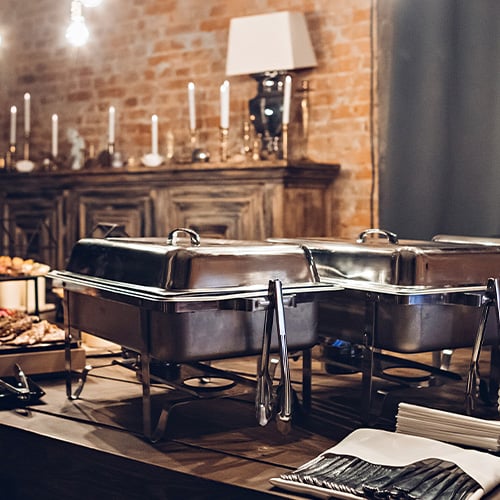
For high-class events and sophisticated settings, fine dining catering is the epitome of elegance. It caters to those who appreciate the finer things in life and are willing to pay a premium for an exceptional culinary experience. These menus are carefully curated, featuring luxurious foods such as caviar, high-quality cuts of meat, and exotic ingredients. Because of this, as well as the meticulous preparation that goes into each dish, fine dining catering comes at a higher price point.
A fine dining experience usually consists of multiple courses and adheres to fine dining etiquette. Your servers should be dressed in fancy server attire, and your kitchen staff should follow strict uniform standards. The ambiance should be upscale to create a sophisticated atmosphere for your guests, necessitating an elevated table setting, including china dinnerware and crystal glassware.
Standard Fine Dining Catering Offerings
- Food: Prix Fixe or A la Carte Service Appetizers, Entrees, Desserts
- Beverage: Prix Fixe Pairings, A la Carte Alcoholic and Non-Alcoholic Beverage Service, Coffee/Tea/Water Service
- Specialty: Alternative Diet Accommodations, Tableside Action Stations, Sommelier Service, Interactive Dining (pairings, cooking demonstrations), Aperitifs and Disgestifs
Catering FAQ
There are many moving parts that operators and customers need to consider when it comes to catering. With so many details to manage, it's no surprise that questions often arise. We'll address some of the most frequently asked questions to help you navigate the world of catering and ensure a seamless experience for both you and your customers.
How Does Catering Pricing Work?
The price of catering services typically depends on the number of guests being served and the level of food and service the customer desires. In addition to these factors, costs for food, labor, rentals, and travel may also be factored into the final price, depending on the type of catering service being provided. In the industry, there are generally three main strategies for pricing services:
- Per person pricing: Under this system, a flat rate is charged for each individual attending the event. This straightforward pricing model allows customers to easily calculate the total cost based on the number of guests. Services can offer variable rates depending on how many people will be served, providing a slight discount for large groups to make the price more manageable.
- Tiered pricing: With tiered pricing, customers are offered different pricing tiers that provide them with varying levels of service and menu options to suit their budget. The tiers typically start with basic services and menus and progress to more extensive offerings as the pricing tier increases, helping customers find the right solution for their needs and budget.
- Custom quotes: Custom quotes provide flexibility and allow the catering service to tailor their offerings to meet the unique needs of each customer. This personalized approach ensures that customers receive a catering package that aligns with their specific requirements.
Do Caterers Need a License?
Whether or not a caterer needs a license to operate their business depends on their specific location. In many states, such as Pennsylvania, caterers are required to obtain various licenses and permits in order to provide their services legally. These licenses may include food handlers permits or liquor licenses, depending on the type of catering being offered. Additionally, some locations may require permits and licenses at the local level instead of the state level. Before you begin providing catering services, check with both local and state authorities to ensure that all necessary documentation is in place.
Catering is a significant part of the foodservice industry, providing events, venues, and customers with quality food and professional service every year. Finding the right menu can elevate any gathering, keeping patrons well fed and the event on track. Recognizing the different types of catering and what sets them apart is essential, whether you're looking to start a catering service or hire one.




